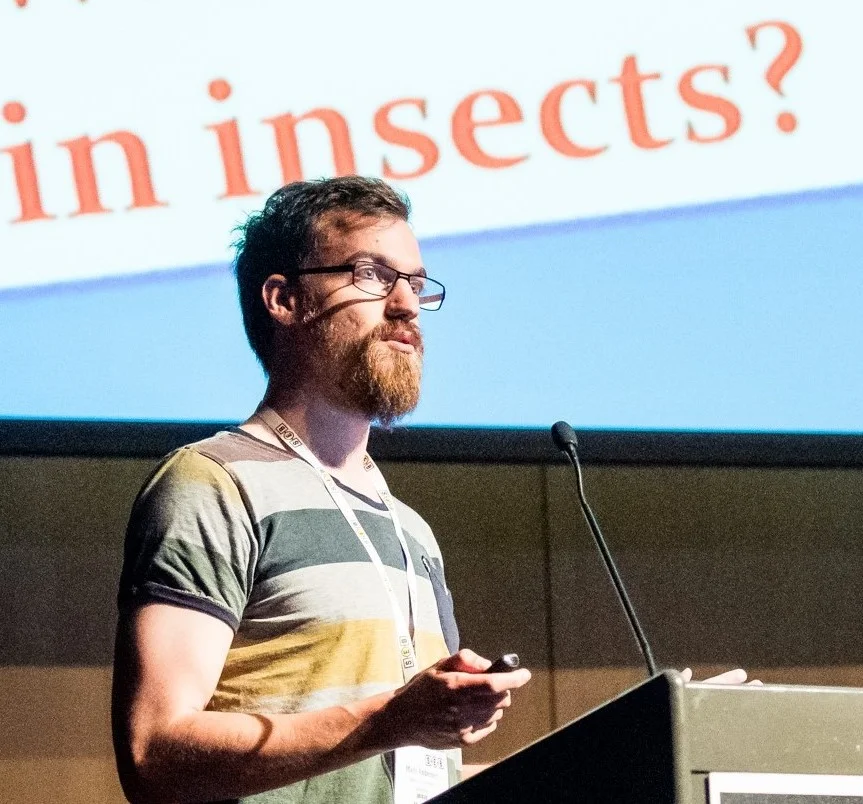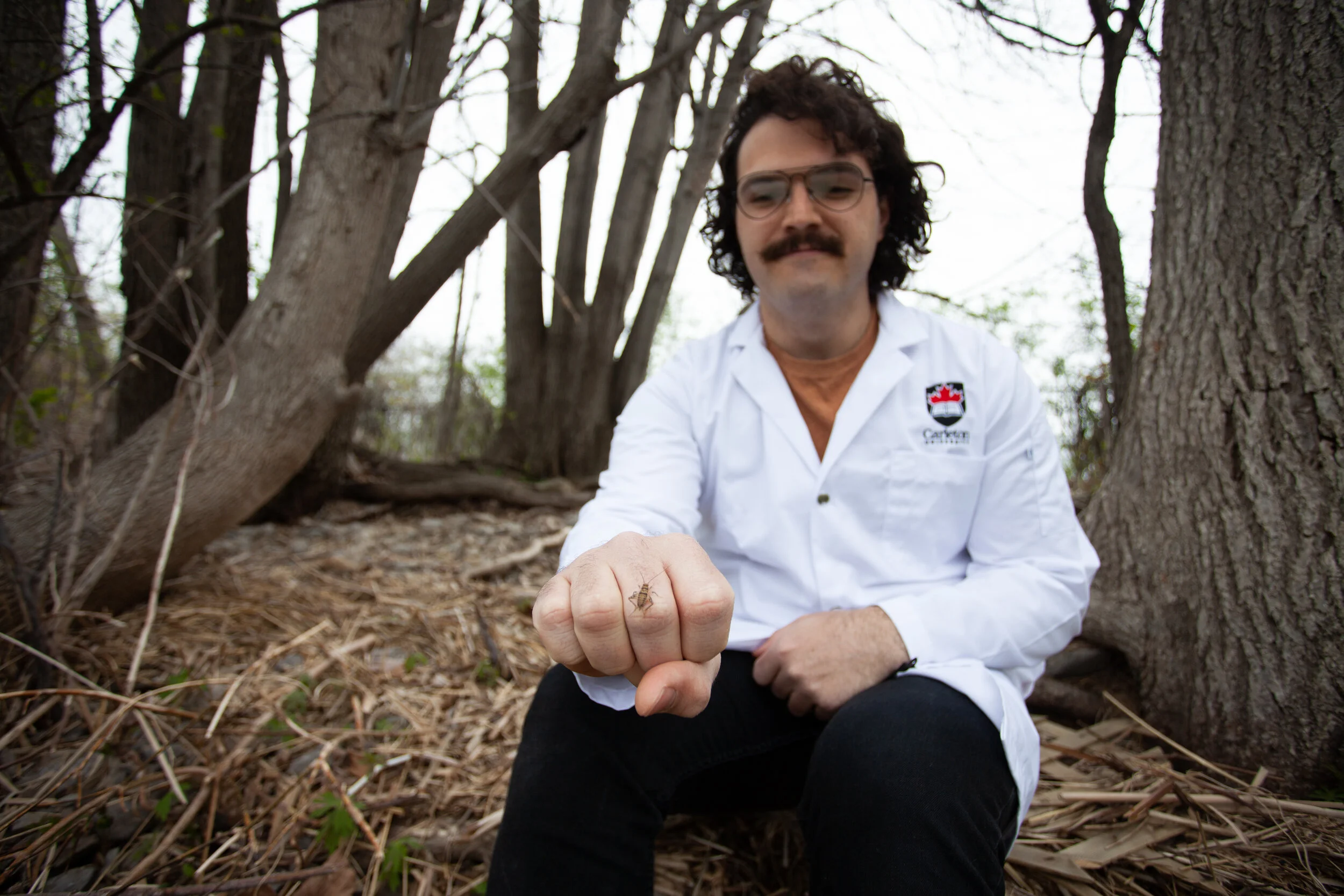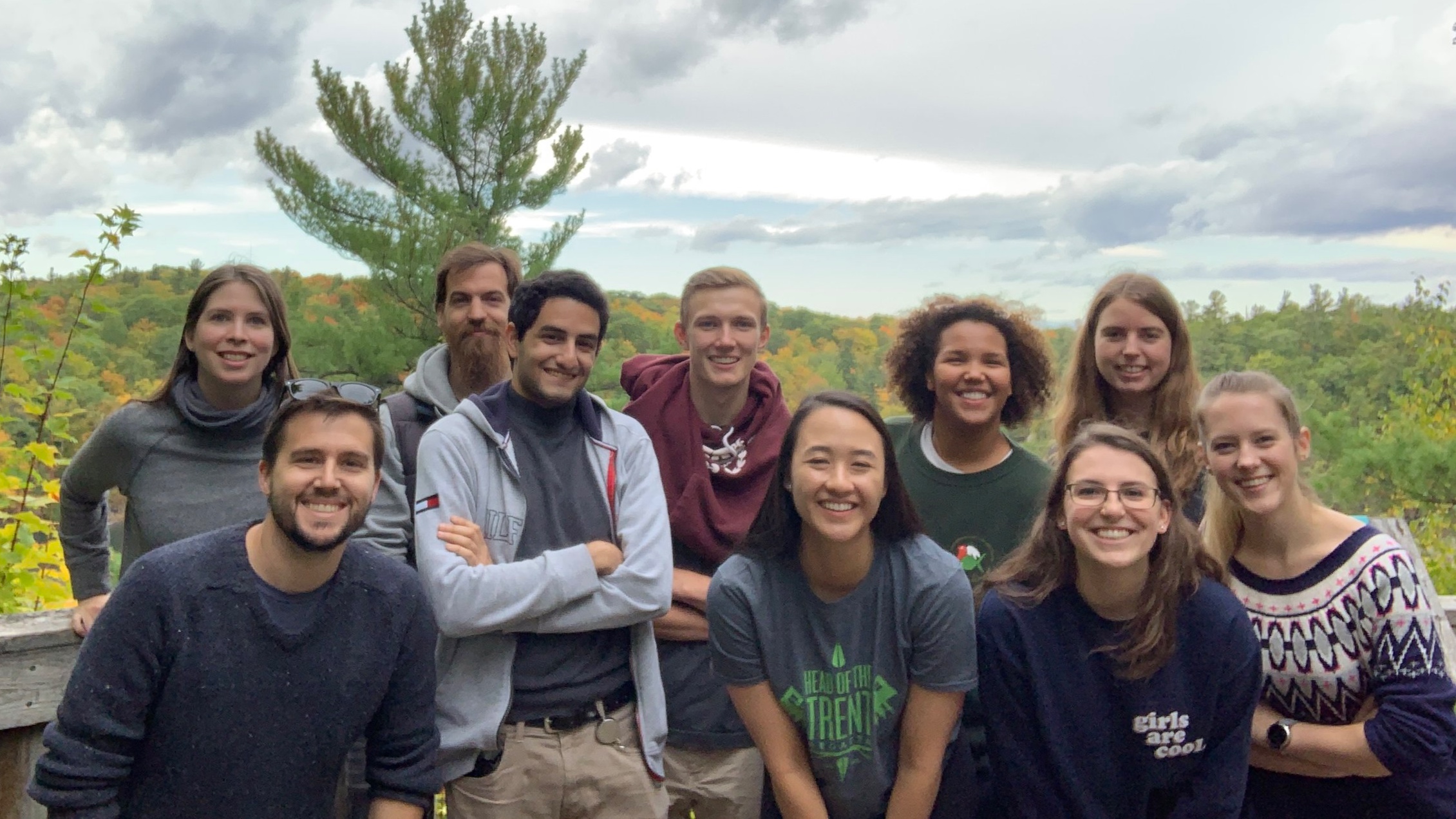MacMillan Lab (Summer 2022)
Back row: Emily McColville, Serita Fudlosid, Matt Muzzatti, Hunter Brzezinski, Heath MacMillan, Mads Andersen, Alex Cheslock Front row: Cassandra Stabile, Fouzia Haider, Ella De Nicola, Marshall Ritchie, Mahmoud El Saadi
Heath MacMillan (Principal Investigator)
I completed my PhD at the University of Western Ontario (London, Canada) with Brent Sinclair and Jim Staples. My first postdoctoral fellowship was with Johannes Overgaard at Aarhus University (Aarhus, Denmark), which was followed by a Banting postdoctoral fellowship with Andrew Donini at York University (Toronto, Canada). I strongly recommend all of these individuals as mentors.
I am broadly interested in the mechanisms underlying thermal performance and stress-related injury. My primary focus is on terrestrial arthropods, but I also dabble in projects on aquatic crustaceans.
See the Publications page for a look at our research history or the Research page to see what we are currently up to in the lab. Prospective lab members should see the Positions page.
Email Heath Google Scholar ResearchGate
Carleton University Profile
Mads Andersen (Postdoctoral Fellow)
After completing my PhD at Aarhus University (Denmark) with Johannes Overgaard, I was awarded a prestigious two-year postdoctoral fellowship from the Carlsberg Foundation which allowed me to join the MacMillan Lab and continue my research on the mechanisms underlying variation in thermal tolerance limits in insects with a focus on neurophysiology and brain ion balance regulation. Specifically, I investigated how the coma-inducing phenomenon known as spreading depolarization is initiated at low temperature in insects, the physiological mechanisms underlying variation in the temperature threshold initiating the spreading depolarization, and if it has any adverse effects on CNS and whole-organism performance.
Currently, I am continuing to work as a postdoc in the MacMillan Lab, but my focus has shifted to investigating the osmoregulatory physiology underlying the extraordinary cold tolerance of the mountain pine beetle, which has allowed invasive species to expand it’s range towards Ontario from the west of Canada.
Email Mads Google Scholar ResearchGate
Li Qing (Postdoctoral Fellow)
I completed my PhD at East China Normal University (Shanghai, China) with Qun Wang where I focused on molecular mechanism of reproduction and development in Eriocheir sinensis, specific to explore the regulatory mechanism of DEAD-box RNA helicase family and the related genes to gametogenesis and vitellogenin (requirement of oocyte maturation) expression.
I joined the MacMillan Lab as a postdoctoral fellow, focusing on understanding the function and mechanisms of septate junctions, forming selective and dynamic molecular barriers to solute diffusion, in cold tolerance of Drosophila melanogaster.
Email Qing
Fouzia Haider (Postdoctoral Fellow)
Fouzia is an eco-physiologist with an interest in bioenergetics and mitochondrial physiology. She joined the MacMillan lab for her postdoctoral study in 2022 where she focuses on the bioenergetics of overwintering insects, especially Mountain Pine Beetles. In her project she aims to investigate the bioenergetics mediated effects of cold tolerance and the underlying mechanisms in these insects. She is also interested in understanding the effects of overwintering on the ecologically important functional traits (flight and dispersal) of these insects.
Before joining the MacMillan lab, she completed doctoral and a short postdoctoral study from University of Rostock, Germany, where she studied the effects of multiple environmental and anthropogenic stressors (such as salinity, hypoxia-reoxygenation, pollutants, mechanical disturbance) on the bioenergetics of marine invertebrates. For her Joint European Master Study, she was funded by the Erasmus Mundus Scholarship and her masters research project at the University of North Carolina focused on the combined effect of pH and bicarbonate on mitochondrial function of marine bivalves.
Email Fouzia LinkedIn Twitter
Jacinta Kong (Postdoctoral Fellow)
I am an ecophysiologist interested in how animals live where they live, with particular interest in the climate adaptation of ectotherms and the ecological and evolutionary causes and consequences of physiological diversity. I completed my PhD at the University of Melbourne, Australia with Michael Kearney and Ary Hoffmann. I then worked as a teaching and research fellow at Trinity College Dublin, Ireland working with Nicholas Payne. I joined the MacMillian Lab in 2023 as a NSERC Alliance-Mitacs Accelerate postdoctoral fellow to work on how diet and rearing context interactions affect the life history of crickets, in partnership with Entomo Farms.
Email Jacinta Website Google Scholar
Matt Muzzatti (PhD candidate; MacMillan and Bertram labs)
Matt completed his MSc at the University of Guelph with Rebecca Hallett, where he developed an action threshold for timing insecticide applications in canola to combat swede midge (Contarinia nasturtii), an established insect pest in Canada. He then joined the MacMillan and Bertram labs in 2020 to work on a research partnership with Entomo Farms, studying how to optimize mass cricket rearing by applying lessons from nutritional ecology.
Email Matt LinkedIn Twitter
Serita Fudlosid (PhD Student)
Serita joined the MacMillan lab in 2018 as an honours undergraduate thesis student then continued on to complete her MSc in 2021 investigating the effects of microplastic ingestion on the growth of the cricket species Gryllodes sigillatus. She has now taken on a role as a PhD student studying the effects of overwintering conditions on the fitness of the mountain pine beetle (Dendroctonus ponderosae).
Email Serita
Mahmoud El Saadi (PhD Student)
Mahmoud joined the MacMillan lab in the fall of 2017 as a volunteer and stuck around as a research assistant and honours student throughout 2018 and 2019. Most recently, Mahmoud completed his MSc with Heath in 2021 where he investigated whether cold stress led to the leak of gut bacteria into the hemolymph ("blood") of locusts. He started his PhD with Heath in January 2022 to examine underlying mechanisms of cold-induced immune activation in insects.
Email Mahmoud
Marshall Ritchie (PhD Student)
Marshall joined the lab in 2018 as a volunteer, work study study, and then honours student, and has served a number of roles in the lab including maintenance of the locust colony and cooking fly food. Marshall completed his MSc in 2022, where he focused on the toxicological effects of bioaccumulation of microplastics in crickets. Marshall’s primary goal is to become a scientific researcher.
Email Marshall
Ella De Nicola (PhD Student)
Ella completed her MSc in Genetics at Stellenbosch University in South Africa in February 2022, where her project involved the construction and bioinformatic evaluation of citrus tristeza virus infectious clones as insect gene silencing vectors. She then joined the MacMillan and Biggar labs as a PhD student at Carleton University in May 2022. Ella’s project involves the identification of candidate miRNAs and the use of RNA interference to understand and disrupt the molecular mechanisms that regulate insect thermal tolerance.
Email Ella LinkedIn Twitter
Becca Dean (PhD Student)
Becca completed her M.Sc at the University of Ottawa with Corrie daCosta and Maria Musgaard, where she studied nicotinic acetylcholine receptor structure and function through a range of computational techniques. She joined the MacMillan Lab in 2022, looking to work on research centered around thermal acclimation and cold tolerance in different insect models.
Email Becca
Sophie Kasdorf (MSc Candidate)
Sophie joined the lab in the fall of 2021 to complete her honours thesis as a fourth-year undergraduate student in Biochemistry. Her project focused on the use of waste products as sustainable protein sources in cricket feed. Sophie started her MSc co-supervised by Sue Bertram in 2022.
Email Sophie
Emily McColville (MSc Candidate)
Emily McColville joined the MacMillan lab as a work-study student in 2020. In 2022, she completed her Honours thesis, which focused on quantifying microplastic ingestion in field crickets. Currently pursuing her MSc, which is co-supervised by Dr. Sue Bertram, Emily is working on interdisciplinary solutions to food supply challenges in long-term space missions. Her current research combines biology and computer vision to leverage AI by monitoring edible insect colonies on Earth and in space. Emily aims to utilize Machine Learning to generate novel insights into unknown aspects of insect physiology, contribute to cultivating insects as a sustainable food source, and help grow the Canadian space sector.In addition to her scientific pursuits, Emily is a passionate science communicator who uses photojournalism, illustrations, and documentary films to engage audiences in her work.
Hunter Brzezinski (I-CUREUS)
Hunter joined the MacMillan lab during the summer of 2021 as a DSRI student, where he assisted Matt Muzzatti in his research on the optimization of mass cricket rearing. Since then, he has routinely been selected for the I-CUREUS program, and will continue his work on biochemical analyses of Gryllodes sigillatus frass throughout the school year.
Cassandra Stabile (I-CUREUS)
Cassandra joined the MacMillan lab during the summer of 2021 as a DSRI student, where she assisted Matt Muzzatti in his research on the optimization of mass cricket rearing. Since then, she has been selected for the I-CUREUS program, and continues her work on biochemical analyses of Gryllodes sigillatus body composition throughout the summer and school year.
Sujitha Manivannan (I-CUREUS)
Sujitha is a third year, undergraduate student in Biology and Biotechnology. She joined the Bertram and MacMillan labs during Fall of 2021 as a DSRI student, where she assisted Matt Muzzatti in his research on the optimization of mass cricket rearing. Since then, she has been selected for the I-CUREUS program, and continues her work on biochemical analysis of Gryllodes sigillatus frass composition throughout the school year.
MacMillan Lab Alumni
Postdocs
Genevieve Ferguson (2018-2019, Now a Lab Coordinator at Carleton)
MSc students
Alexandra Cheslock (2020-2023; now in medical school at McGill University)
Jessica Robichaud (2020-2022; now a PhD student with Steve Cooke)
Marshall Ritchie (2020-2022; now a PhD student with Heath MacMillan)
Serita Fudlosid (2019-2021; now a PhD student with Heath MacMillan)
Mahmoud El Saadi (2019-2021; now a PhD student with Heath MacMillan)
Kaylen Brzezinski (2017-2019; Now a Lab Coordinator at Carleton)
Gil Yerushalmi (2016-2018; York University, Co-supervised with Andrew Donini; Now in medical school at the University of Toronto)
Honours students
Flor Barbosa (F2022/W2023)
Hannah Anderson (F2021/W2022)
Kyra Kavanagh (F2021/W2022)
Sophie Kasdorf (F2021/W2022; now a MSc coadvised by MacMillan and Bertram)
Rosemary Hill (F2020/W2021)
Erica O’Neill (NSERC USRA) (S2020, F2020/W2021)
Sarah Chalmer (F2019/W2020)
Dawson Livingston (F2019/W2020; Now an MSc at UOttawa)
Marshall Ritchie (F2019/W2020; Now a PhD in the MacMillan lab)
Alexandra Cheslock (F2019/W2020)
Irfan Dhanidina (S2019)
Mahmoud El Saadi (S2019; Now a PhD in the MacMillan lab)
Serita Fudlosid (F2018/W2019; Now a PhD in the MacMillan lab)
Ravneet Hansi (F2018/W2019; Now an MSc student at UBC in Vancouver)
Jessica Carrington (F2018/W2019)
Mirvat Noubani (F2017/W2018)
Hirva Patel (F2017/W2018; Now an MSc student at Northeastern University in Boston)
MacMillan Lab (2019)
Back row: Hannah Davis, Mads Andersen, Dawson Livingston, Serita Fudlosid, Rosmary Hill, Front row: Heath MacMillan, Mahmoud El Saadi, Kaylen Brzezinski, Sarah Chalmer, Alex Cheslock. Not pictured: Marshall Ritchie, Bassam Helou, Erica O’Neil.


















